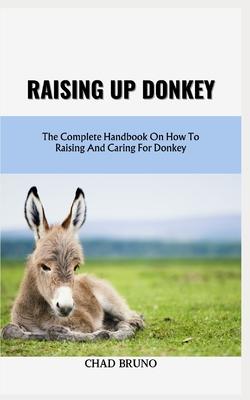
Book
Raising Up Donkey: The Complete Handbook On How To Raising And Caring For Donkey
by Chad Bruno
(Write a Review)
Paperback
$8.69
- Donkeys are members of the genus Equus, subgenus Asinus, species Equus africanus. They have a common ancestor with zebras and horses.
- Donkeys differ physically from horses in that they are shorter and stockier. They have a tuft of hair at the end of their tail and large, pointed ears. Coat colors range from gray and brown to black and white.
- Donkeys have a reputation for having a calm and reserved demeanor. Many people believe they are less flighty and more careful than horses. Because of this, they excel at particular jobs, such as transporting huge goods.
- Donkeys have served several functions for people for thousands of years. They're useful for carrying loads, plowing fields, and serving as leisure mounts. Their mild demeanor makes them ideal for use in rehabilitation programs, especially those aimed at children.
- The average lifespan of a donkey is between 25 and 30 years, but with the right care, some may live even longer.
- Donkeys are domesticated, yet their wild forebears, the African wild asses, can be found in many different regions of Africa.
- Different breeds of donkeys have their own distinct features. Some examples include the American Mammoth Jackstock, the Miniature Mediterranean donkey, and the Standard donkey.
- Donkeys are well-known for their unique vocalizations, including the distinctive bray. Often compared to a snort and a hee-haw, the bray of a donkey is a loud and distinctive noise. Donkeys utilize braying to communicate with other donkeys and alert their presence to people.
- Donkeys have played an important part in numerous cultures throughout history, aiding in transportation and farming. They have continued use in many places throughout the globe, particularly in rural areas where motorized machinery is scarce.
- Preserving: Loss of habitat and poaching pose a threat to wild African donkey populations. Conservation and protection efforts are in work for these natural populations.
Donkeys have been helpful to people for a long time and in many ways, and this is still the case in many places of the world today. The strength, stamina, and kindness of these creatures are highly prized
- Donkeys are members of the genus Equus, subgenus Asinus, species Equus africanus. They have a common ancestor with zebras and horses.
- Donkeys differ physically from horses in that they are shorter and stockier. They have a tuft of hair at the end of their tail and large, pointed ears. Coat colors range from gray and brown to black and white.
- Donkeys have a reputation for having a calm and reserved demeanor. Many people believe they are less flighty and more careful than horses. Because of this, they excel at particular jobs, such as transporting huge goods.
- Donkeys have served several functions for people for thousands of years. They're useful for carrying loads, plowing fields, and serving as leisure mounts. Their mild demeanor makes them ideal for use in rehabilitation programs, especially those aimed at children.
- The average lifespan of a donkey is between 25 and 30 years, but with the right care, some may live even longer.
- Donkeys are domesticated, yet their wild forebears, the African wild asses, can be found in many different regions of Africa.
- Different breeds of donkeys have their own distinct features. Some examples include the American Mammoth Jackstock, the Miniature Mediterranean donkey, and the Standard donkey.
- Donkeys are well-known for their unique vocalizations, including the distinctive bray. Often compared to a snort and a hee-haw, the bray of a donkey is a loud and distinctive noise. Donkeys utilize braying to communicate with other donkeys and alert their presence to people.
- Donkeys have played an important part in numerous cultures throughout history, aiding in transportation and farming. They have continued use in many places throughout the globe, particularly in rural areas where motorized machinery is scarce.
- Preserving: Loss of habitat and poaching pose a threat to wild African donkey populations. Conservation and protection efforts are in work for these natural populations.
Donkeys have been helpful to people for a long time and in many ways, and this is still the case in many places of the world today. The strength, stamina, and kindness of these creatures are highly prized
Paperback
$8.69